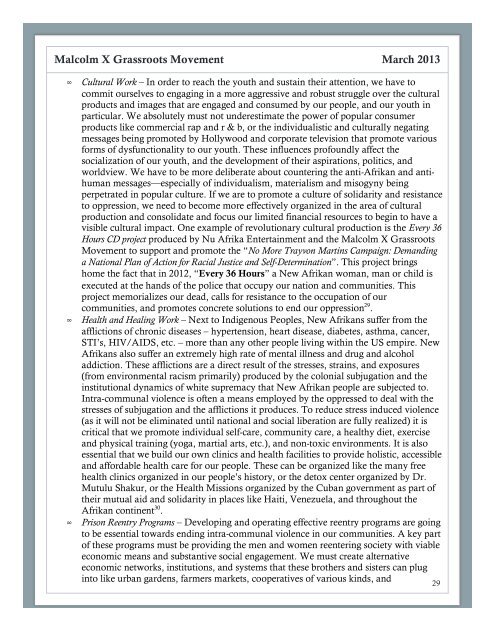MXGM Self-Defence Manual
MXGM Self-Defence Manual
MXGM Self-Defence Manual
You also want an ePaper? Increase the reach of your titles
YUMPU automatically turns print PDFs into web optimized ePapers that Google loves.
;<br />
Malcolm X Grassroots Movement March 2013<br />
• Cultural Work – In order to reach the youth and sustain their attention, we have to<br />
commit ourselves to engaging in a more aggressive and robust struggle over the cultural<br />
products and images that are engaged and consumed by our people, and our youth in<br />
particular. We absolutely must not underestimate the power of popular consumer<br />
products like commercial rap and r & b, or the individualistic and culturally negating<br />
messages being promoted by Hollywood and corporate television that promote various<br />
forms of dysfunctionality to our youth. These influences profoundly affect the<br />
socialization of our youth, and the development of their aspirations, politics, and<br />
worldview. We have to be more deliberate about countering the anti-Afrikan and antihuman<br />
messages—especially of individualism, materialism and misogyny being<br />
perpetrated in popular culture. If we are to promote a culture of solidarity and resistance<br />
to oppression, we need to become more effectively organized in the area of cultural<br />
production and consolidate and focus our limited financial resources to begin to have a<br />
visible cultural impact. One example of revolutionary cultural production is the Every 36<br />
Hours CD project produced by Nu Afrika Entertainment and the Malcolm X Grassroots<br />
Movement to support and promote the “No More Trayvon Martins Campaign: Demanding<br />
a National Plan of Action for Racial Justice and <strong>Self</strong>-Determination”. This project brings<br />
home the fact that in 2012, “Every 36 Hours” a New Afrikan woman, man or child is<br />
executed at the hands of the police that occupy our nation and communities. This<br />
project memorializes our dead, calls for resistance to the occupation of our<br />
communities, and promotes concrete solutions to end our oppression 29 .<br />
• Health and Healing Work – Next to Indigenous Peoples, New Afrikans suffer from the<br />
afflictions of chronic diseases – hypertension, heart disease, diabetes, asthma, cancer,<br />
STI’s, HIV/AIDS, etc. – more than any other people living within the US empire. New<br />
Afrikans also suffer an extremely high rate of mental illness and drug and alcohol<br />
addiction. These afflictions are a direct result of the stresses, strains, and exposures<br />
(from environmental racism primarily) produced by the colonial subjugation and the<br />
institutional dynamics of white supremacy that New Afrikan people are subjected to.<br />
Intra-communal violence is often a means employed by the oppressed to deal with the<br />
stresses of subjugation and the afflictions it produces. To reduce stress induced violence<br />
(as it will not be eliminated until national and social liberation are fully realized) it is<br />
critical that we promote individual self-care, community care, a healthy diet, exercise<br />
and physical training (yoga, martial arts, etc.), and non-toxic environments. It is also<br />
essential that we build our own clinics and health facilities to provide holistic, accessible<br />
and affordable health care for our people. These can be organized like the many free<br />
health clinics organized in our people’s history, or the detox center organized by Dr.<br />
Mutulu Shakur, or the Health Missions organized by the Cuban government as part of<br />
their mutual aid and solidarity in places like Haiti, Venezuela, and throughout the<br />
Afrikan continent 30 .<br />
• Prison Reentry Programs – Developing and operating effective reentry programs are going<br />
to be essential towards ending intra-communal violence in our communities. A key part<br />
of these programs must be providing the men and women reentering society with viable<br />
economic means and substantive social engagement. We must create alternative<br />
economic networks, institutions, and systems that these brothers and sisters can plug<br />
into like urban gardens, farmers markets, cooperatives of various kinds, and<br />
29


